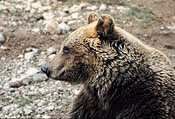Majestic Maiella
Barren yet beautiful, harsh yet haunting, Mount Majella in Abruzzo is half invocation, half curse.
 As curses go Maiella is as good as you'll get. Local speech is peppered with it. Indeed the best curses use the big things that are close to us, even better if they are divinities, and in Abruzzo things don't get much bigger, closer, or divine than the Maiella Range. It's not that the Abruzzesi have anything against Maiella, quite the opposite - they summon it in their hour of need to give them strength to react against life's many adversaries. In this light Maiella is a worthy curse, perfect - if curses can be perfect.
As curses go Maiella is as good as you'll get. Local speech is peppered with it. Indeed the best curses use the big things that are close to us, even better if they are divinities, and in Abruzzo things don't get much bigger, closer, or divine than the Maiella Range. It's not that the Abruzzesi have anything against Maiella, quite the opposite - they summon it in their hour of need to give them strength to react against life's many adversaries. In this light Maiella is a worthy curse, perfect - if curses can be perfect. Maiella takes its name from the goddess Maja who, after years of searching for her son, ended her days here. Maja was a harsh and upright mother who was loving and gentle with her children. The primitive churches and hermitages present in even the range's most inaccessible valleys and gorges are a constant reminder of the spiritual importance of these peaks which, wherever you are in the area, seem to fill the horizon. So close, you could reach out your hand to touch them. Yet the closer you get the further they seem to become.
The Maiella Range is part of the Apennines, just south of Gran Sasso. Like all ranges its peaks stand out like proud warriors ready for battle, and we, the mountaineers, muster up our courage to conquer them as quickly as possible. But once the battle is won the mountains unfold before your eyes, welcoming you home to a rough, elemental yet maternal world. On first impressions Maiella seems inhospitable with its deep gorges and craggy summits, storms flare up and flash by, limestone plateaux remind you of the Central Asian Steppes and then there are the caves, the forests and tumbling waterfalls . . . Wolves, eagles and bears still populate this land. A land which once belonged to the sea. Sit and turn your curses on the shells and sharks' teeth beneath your feet. And yet there are no real reasons to come here. Walkers fear its endless trails and climbers lack a challenge in its heights. Don't forget, this is one of the last places in Europe where you can still experience the sublime pleasure of losing yourself in the immensity of nature.
 Majella. A strong, savage mother who can bring a smile to your face. A mother who, like all mothers, has nourished her children for thousands of years. This mixture of harsh rock and green valleys attracted different types of settlers. The high mountain pastures brought riches in dues and taxes as the shepherds passed through with their flocks on the yearly journey from Apulia to Central Italy. Hermits crossed the land, the most illustrious being Pope Celestine V up until Teodoro Paterra in recent times. Bandits and thieves took refuge in these hills, cursing fortune and the law alike.
Majella. A strong, savage mother who can bring a smile to your face. A mother who, like all mothers, has nourished her children for thousands of years. This mixture of harsh rock and green valleys attracted different types of settlers. The high mountain pastures brought riches in dues and taxes as the shepherds passed through with their flocks on the yearly journey from Apulia to Central Italy. Hermits crossed the land, the most illustrious being Pope Celestine V up until Teodoro Paterra in recent times. Bandits and thieves took refuge in these hills, cursing fortune and the law alike. The landscape is breathtaking, echoes ringing out to the horizon. Its ruggedness and inclemency impassion rather than discourage. Some have tried to market Majella, reducing her majesty to a mere symbol of natural beauty. Those who really fall under her spell rarely mention her name, lest ill befall her.
And on the way down, passing through those little villages clinging to her rock, whose names recall the local crafts - stone, wood, copper and lace, you take comfort in hearing her name repeated time and time again. That Mannaggia Maiella, which, rather than curse or damnation is a laconic, almost solemn, way of currying favour. A throwback to pagan times, an incantation rather than ill omen.